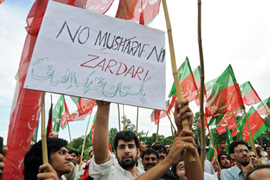Presidential vote opens in Pakistan
Asif Ali Zardari, widower of the late Benazir Bhutto, widely expected to win election.

Al Jazeera’s correspondent in Islamabad, Kamal Hyder, said there was concern about whether or not the new president would relinquish some of the powers held by Musharraf.
“Musharraf was the military chief and had supreme powers, but a civilian president will not likely have those powers,” he said.
“One of the PML-N’s leaders said that an act of parliament would be needed to remove the powers taken up by Musharraf. If they are not taken away, it will just be continuation of one-man rule.”
Hyder said that Pakistan’s provinces were given 65 votes each, despite some having more seats than others, which puts the PPP and Zardari in a very comfortable position.
Voting is due to end at 3pm (9GMT).
Election contenders
There are 32 candidates running, but Zardari faces his strongest competition from just two.
Saeed Zaman Siddiqui, a former supreme court chief justice, is the candidate backed by Nawaz Sharif, a former prime minister and leader of the Pakistan Muslim League (Nawaz) party (PML-N).
| Power and politics | ||
|
|
Mushahid Hussain is a senator for the Pakistan Muslim League (Quaid-e-Azam), the party which staunchly supported Musharraf.
“It will be an easy victory for Asif Ali Zardari as we have the support of more than 400 lawmakers out of about 700,” Farhatullah Babar, a spokesman for the PPP, said.
The next president of Pakistan will have to face a myriad of problems plaguing the country, including its economic malaise and increasing violence in the north.
Talat Masood, a Pakistani political analyst, told Al Jazeera that it was “ironic that Zardari is going to be Pakistan’s president”.
“A wave of events have pushed him into this position from spouse to the president of Pakistan.
“There is no doubt he has a controversial past and his reputation is soiled. He will have to work very hard to improve his reputation.
“People are sceptical, but they want the democratic process to move forward and this selection is part of that process.
“He is the most powerful person in Pakistan. He can oversee the work of the prime minister and his political party, so all these things make him very powerful.
“The only thing is whether he will do good for Pakistan with this power or not.”
Waziristan raids
On the eve of the election, Pakistani officials reported five people had been killed in a US air raid in North Waziristan province, the second in 24 hours.
The deaths were allegedly caused by missiles from an unmanned drone on Friday, with different sources referring to those killed as either fighters or civilians.
A suspected US drone missile also killed four people near the area a day earlier.
Pakistan summoned the US ambassador on Wednesday to protest against the killing of 20 people by US commandos from across the border in Afghanistan.
Unrest in the northwest has been attributed to tribal anger at Musharraf’s support for the US “war on terror”.
Bombings and suicide attacks have killed nearly 1,200 people across Pakistan in the past year alone.
Faltering economy
 |
|
Many Pakistanis protested against the nomination of Zardari on the eve of the vote [AFP]
|
Musharraf’s resignation triggered Saturday’s election but his military policy is likely to continue with Zardari.
The 53-year-old presidential hopeful has said that Pakistan will continue to back the US if he is elected.
“I will work to defeat the domestic Taliban insurgency and to ensure that Pakistani territory is not used to launch terrorist attacks on our neighbours or on Nato forces in Afghanistan,” he said in a Washington Post article.
“We stand with the United States, Britain, Spain and others who have been attacked.”
Besides the violence, Pakistan’s new president will have to work to turn around a faltering economy.
Rampant inflation and an unstable political situation have contributed to a 40 per cent fall on the stock market since January.
Islamabad is already heavily dependent on the billions of dollars of aid sent from Washington since Musharraf backed the US invasion of Afghanistan after the September 11 attacks in 2001.
